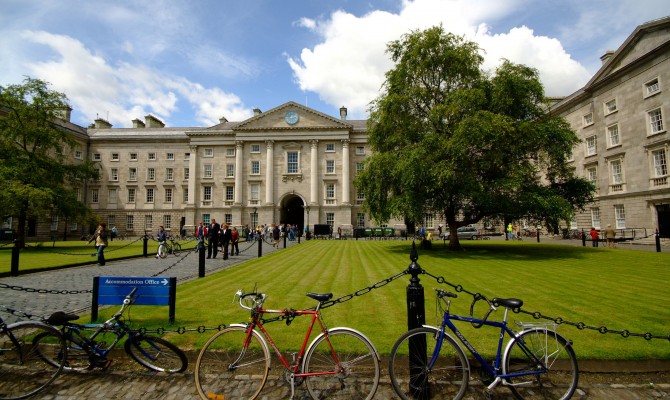Trinity has risen 10 places to 88th in the 2018 QS world university ranking. This is a reversal of recent trends, which has seen the college fall consistently in the rankings over the past three years. Trinity scored an overall 74.30 out of a possible 100 points.
In this year’s rankings, Trinity continues to be Ireland’s highest ranked university, with University College Dublin (UCD) in second place at 168th in the world, which is a rise from 176th place last year. The third Irish university to rise in the rankings is NUI Galway, which has risen to 243rd place. University College Cork (UCC) remains in 283rd place
Some Irish universities did see their place drop in the QS world university ranking again this year. Dublin City university (DCU) has fallen by 11 places from 380th to 391th, but has managed to remain within the top 400. Meanwhile, Queen’s university Belfast has fallen from the top 200, placing in 202nd this year, a fall from 195th. Dublin Institute of Technology (DIT) again failed to enter the top 650 universities.
The top position was taken by Massachusetts Institute of Technology (MIT) with Stanford University and Harvard taking second and third place respectively.
Trinity fell from 78th place in the 2016 rankings to 98th place in the 2017 rankings. Provost Patrick Prendergast released a statement at the time, claiming that the dramatic result was due to the lack of investment in the higher education system. Dramatic declines have also been seen in the Times Higher Education Rankings, in which Trinity currently places 131st in the world, a fall from previous years.
Trinity has made attempts to increase their position by way of an increased focus on internationalisation and the creation of a Ranking Steering Group. The latter is chaired by the Provost and focuses on areas such as citations, staff composition,outputs and funding levels.
The QS World Rankings are based on six factors: academic reputation, employer reputation, student-to-faculty ratio, citations per faculty, international faculty ratio, and international student ratio. Academic and Employer reputation are both based on global surveys sent out to academics.
Student to faculty ratio makes up 20% of the overall ranking, and is a measure of the number of academic staff relative to the number of students. The number of times research papers published by that university have been cited in other research papers account for 20% of the final score. International faculty ratio and international student ratio both account for 5% of the ranking, and notes the proportion of academic staff and students who come from other countries.
Additional reporting by Aisling Grace and Seana Davis.
This article was amended at 15.51, Thursday 8 June to correct a typo which said DCU remains in the top 300, rather than the top 400.







